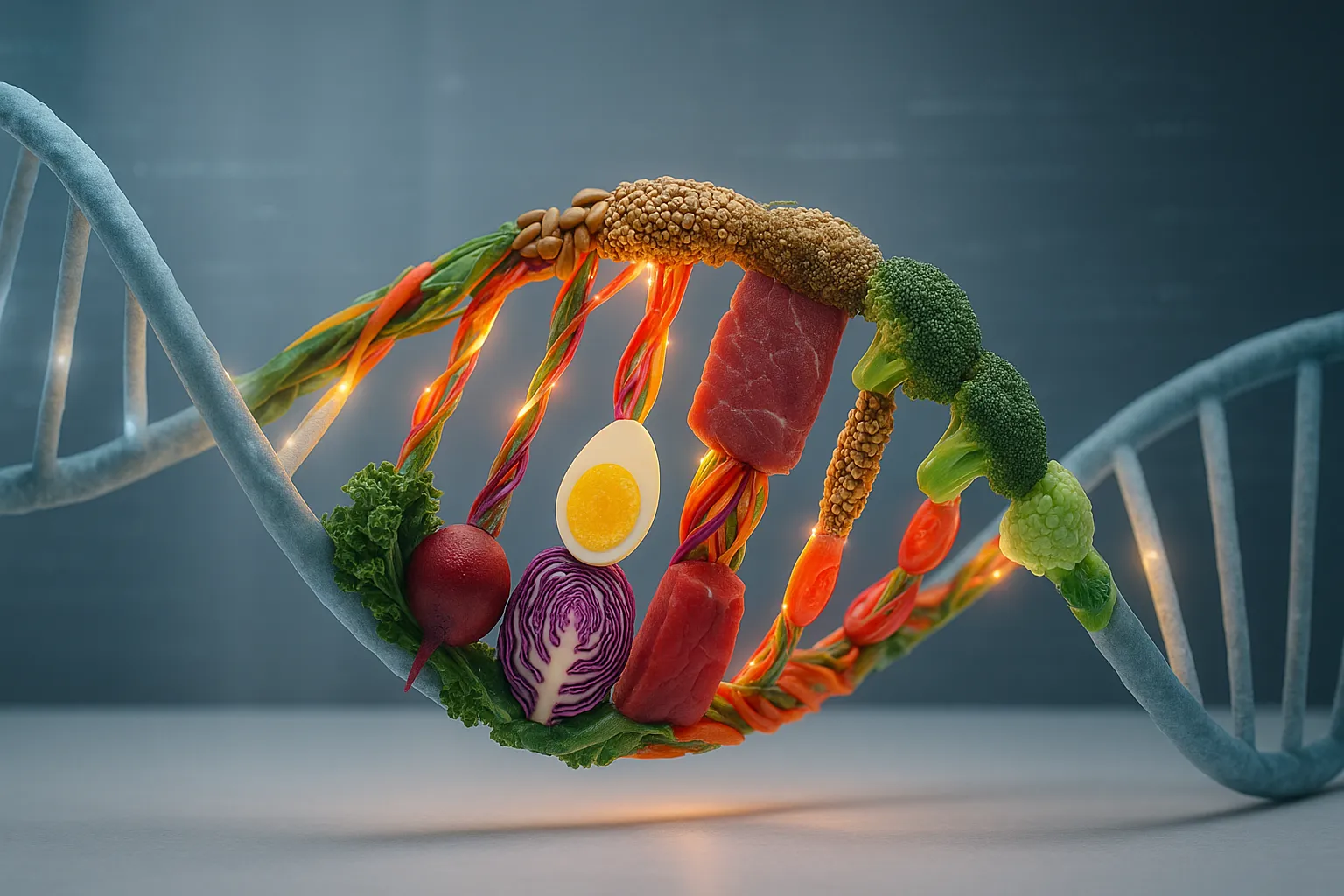
Some foods can be associated with your DNA and have a say in how your body works at a most basic level. This concept, known as “gene expression food,“ suggests that nutrients can either stimulate or inhibit specific metabolic pathways, thereby influencing the risk of disease. What you eat sends signals to your genes, making them more or less active, and it’s those signals that explain why some diets and some vitamins work for some people but not for others. Your choices in the kitchen today will be at the foundation of your health tomorrow.
Key Takeaways
Gene expression food connects diet to DNA, showcasing how nutrients can influence gene activity, impacting metabolism, chronic disease risk, and overall health.
Nutrients such as folate and omega-3 fatty acids can modulate gene expression, thereby enhancing cellular processes and reducing inflammation at a genetic level.
Personalized nutrition leverages genetic insights to create tailored diets that improve health outcomes and prevent chronic diseases.
Epigenetic diets emphasize bioactive foods, such as cruciferous vegetables and antioxidants, to optimize gene behavior and support wellness.
Functional foods and nutrigenomics are revolutionizing healthcare, providing personalized nutrition solutions that align with individual genetic profiles.
Dietary choices play a preventive role, actively shaping gene responses to minimize the risks of conditions such as diabetes, obesity, and heart disease.
Table of Contents
Unlocking the Power of Gene Expression Food
Picture this: every bite you take is like sending a message to your DNA—a kind of text message between food and your genes. This isn’t some sci-fi fantasy; it’s the foundation of gene expression, food, and the science of nutrigenomics. By choosing the right foods, you can influence how your genes function, supporting your body’s natural defenses and helping to prevent chronic conditions. Think of it as hitting the gym but for your cells!
1. Choosing Nutrients That Speak to Your DNA
Some nutrients are like translators—they “speak” to your genes in ways that can boost health. Folate, for example, helps a process called DNA methylation, which keeps your genes working properly. Foods rich in folate include spinach, broccoli, and lentils, and they’re gold stars for your cellular performance. Then there are omega-3 fatty acids, found in salmon and walnuts, which reduce inflammation right down to your genes.
2. The Role of Diet and Genetic Regulation
Ever wondered why one diet doesn’t work for everyone? It’s because your DNA plays a starring role in how your body handles nutrients. While some people’s genes thrive on high-protein diets, others may struggle due to variations in genes like FTO, which are associated with obesity and metabolism. Understanding your unique genetic profile enables you to tailor your diet accordingly, much like having a blueprint for personalized health.
3. Fighting Chronic Conditions with Food Impact on Genes
Diabetes, heart condition, and even obesity aren’t just influenced by family history; they’re impacted by how your lifestyle and diet interact with your genes. For instance, high-glycemic-index foods can trigger unfavorable gene expression, potentially putting you on a fast track to metabolic issues. On the other hand, pairing whole grains and leafy greens with a healthy lifestyle can positively influence gene expression, helping to prevent chronic diseases.
4. The Superpowers of the Epigenetic Diet
Let’s talk about the “epigenetic diet”—a food plan designed to tweak gene expression without rewiring your DNA. It’s got some all-stars you know and love: cruciferous vegetables like kale and cauliflower, garlic for its detoxifying superpowers, and antioxidant-loaded grapes. These foods influence epigenetic activity, such as histone modification and DNA methylation, thereby creating healthier gene expression. It’s like giving your genome a tune-up!
5. Nutrient-Gene Expression for Lifelong Wellness
The beauty of nutrient-gene expression is that it’s dynamic—you’re not stuck with the bad hand your genes dealt you. Eating a diet rich in vitamins B6, B12, and A can help regulate gene-related processes, such as protein synthesis and fat storage. Think of these nutrients as the backstage crew, quietly managing your body’s systems to prevent problems before they become visible.
6. Personalized Nutrition’s Role in Future Healthcare
Here’s where things get exciting. Nutrigenomics isn’t just about eating better—it’s shaping the future of medicine with precision approaches. Imagine a world where you have a detailed map of your genes and know precisely which foods shield you from illness or boost your energy. It’s not far off. These insights into diet and genetic regulation are already changing how practitioners develop targeted nutrition plans.
Eating for your genes might sound fancy, but it’s a truly accessible way to take control of your health. By embracing gene expression food, you’re playing an active part in how your body thrives—one forkful at a time.

The Science Behind Gene Expression Food
How Food Modulates Gene Expression
Think of it like this: your genes are a playlist, and the food you eat works like a DJ, deciding which tracks to play loud, which to mute, and which to skip entirely. Nutrients and bioactive compounds in your diet directly interact with your DNA, influencing how your body functions, much like flipping switches in a control panel.
Here’s how it works:
Food Component | Mechanism of Action | Examples/Effects |
|---|---|---|
Macronutrients (e.g., fatty acids, proteins) | Regulate metabolism and growth-related genes. | Omega-3 fatty acids reduce inflammation by modulating the expression of genes related to the immune system. |
Micronutrients (e.g., vitamins) | Affect hormonal balance, immunity, and detoxification. | Folate supports DNA methylation, stabilizing gene expression. |
Bioactive Chemicals (e.g., flavonoids) | Act as ligands for transcription factors, thereby altering gene expression. | Genistein (soy) and resveratrol (grapes) directly influence gene activity. |
Choline | Modifies signal transduction and chromatin structure. | Influences methylation, regulating gene expression indirectly. |
Anthocyanins (e.g., bilberries) | Downregulate inflammation-related transcription factors. | Reduce interleukin-8 and IFN expression by 25% and 15%, respectively. |
Folate | Supports DNA methylation and thymidine synthesis. | Deficiency causes DNA damage comparable to that caused by radiation exposure. |
Eating food is not just about taking in calories; it interacts directly with your genes and influences key bodily functions, such as metabolism and immune system response. Scientific studies have established a strong connection between diet and gene regulation. Every meal you eat sends a message to your genes, telling them whether to function optimally for your health or not.
Common Misconceptions to Address
Let’s bust some myths, shall we?
Myth #1: “Your genes are your destiny, so diet doesn’t matter much.“
This couldn’t be farther from the truth. Although you cannot alter your genetic code, you can have a significant say in how and whether your genes are expressed. Think of it this way: You’re given a piano at birth, with all its keys intact. But you can choose which tunes, if any, to make your instrument play.
Myth #2: “Genetic testing will give you a perfect diet blueprint.“
The reality is this: genetic testing offers precious glimpses into what makes us tick, but it is not a magic wand that reveals all. Your genes are not in some controlled environment where they are free to express themselves as they would under ideal laboratory conditions. They interact with the everyday realms of our lives: the world we live in, how we inhabit it, and the people we’re with (or not, when we’re alone). You have likely heard it said that our lives are constantly influenced by the genes we inherited from our parents.
Myth #3: “Only ‘superfoods’ can influence gene expression.“
Every time you take in sustenance, you have an impact on how your genes express themselves. For example, sipping your am coffee activates the expression of genes that get busy metabolizing caffeine. Salads at lunch? They add nutrients that enable the expression of divinely inspired, small protein-encoding genes. Genistein (from soy) or resveratrol (from grapes) are but two common food ingredients that serve as significant modulators of divine inspiration, if not the health of your local cell colonies.
The overlooked truth: Most people don’t realize that food impacts genes with every single meal. You’re not just feeding your body—you’re programming it. Those berries in your smoothie can reduce inflammatory gene expression by up to 25%. That’s not magic; that’s biochemistry in action.
Gene Expression Food in Health
Managing Chronic Diseases
When it comes to managing chronic diseases, what you eat can influence your genes, much like sending a text message to your DNA. Foods rich in specific compounds can help “rewrite” how your body responds to conditions like diabetes, cardiovascular conditions, obesity, and even cancer.
Diabetes: Your morning coffee or dark chocolate may help more than just your mood. Foods rich in polyphenols, like resveratrol (found in red grapes and berries), can tweak how your genes manage glucose. With over 65 genetic variants linked to Type 2 Diabetes, targeting these pathways through what you eat may improve glucose tolerance—essentially coaching your cells to work smarter.
Cardiovascular Condition: Omega-3 fats are nutritional superstars for heart health. These fats, often found in salmon and flaxseeds, modulate genes like PPAR and LPL to lower bad cholesterol (LDL) while nudging your good cholesterol (HDL) higher when paired with high-fat diets. Think of it as fine-tuning your heart’s playlist to a healthier beat.
Obesity: Ever wondered why some people gain weight differently? Genetics plays a hefty 80% role in BMI differences, which is one of the reasons blanket diet advice often flops. The good news? Anti-inflammatory nutrients, such as the lycopene in tomatoes, may help reduce obesity-related gene activity, allowing your body to respond more effectively to healthier meals.
Cancer: Here’s a stunning fact—diet contributes to 70% of cancer cases. Imagine adding soy-loaded smoothies or omega-3-packed meals to your diet to suppress tumor-related genes. These foods don’t just support general health; they disrupt harmful gene signals, stopping rogue cells in their tracks.
Functional Foods and Personalized Nutrition
Consider food as a toolkit for your health. Functional foods, specifically designed to deliver bioactive compounds, are emerging as cornerstone players in the field of personalized nutrition. Genetically modified tomatoes enhanced with nutrients tailored to your specific genetic profile, and beverages fortified to achieve certain health goals, such as lowering cholesterol, are prime examples of the functional foods of the future.
Personalized Plans: Here’s where things get even cooler. Genetic testing can reveal how your body interacts with what you eat. If you find out you’ve got an APOE4 allele, your doctor might suggest ditching saturated fats for heart-friendly alternatives like avocado and olive oil. It’s food meeting science in the best way possible.
The Big Mistake: Many people still adhere to one-size-fits-all diet plans. But genes don’t follow the same rules for everyone—this is why understanding how food impacts your genes is key. It’s like putting diesel into a car that runs on unleaded. Diving into how nutrient-gene expression works can save you from the frustration of generic diets that don’t deliver.
When it comes to diet and genetic regulation, thinking small—down to the molecular level—can lead to significant health wins.

Practical Applications of Gene Expression
Imagine if your plate could double as your health coach—that’s the magic of gene expression food. This concept isn’t just about eating right but eating smart, using the unique blueprint of your DNA to guide your choices. Let’s jump into the ways you can take action.
Tailoring Your Diet
Your genes fashion your body to react a particular way to various diets and fitness plans. For instance, certain variations of the FTO gene might make a high-protein regimen perfect for your metabolism; conversely, if your family has a history of heart problems, cutting down on sodium and saturated fats could offset your genetic risks. Then, too, there are workouts like sprinting and distance running; which one you excel at can depend a lot on your genes, which in turn might help you decide between spin classes and hitting the trail.
Everyday Examples
Your genes can influence your cravings, your sensitivity to caffeine, and even how well omega-3s work for you. When you understand the biochemistry of your family, you can use that knowledge to make better food choices. For instance, if your family has a history of diabetes, you might consider making a trade—sweets for fruit—that lowers your risk. Another choice might involve caffeine. If you feel jittery after a cup of coffee but still want to enjoy the morning ritual of a pick-me-up, genetic knowledge can guide you to decaf. Biochemical insights can also prompt tailored advice.
Emerging Trends in Nutrigenomics (2025)
Gene expression food is rewriting the rules of how we think about diet and health. As we step into 2025, nutrigenomics is truly coming into its own, blending cutting-edge science with practical applications for personal and preventive healthcare.
Cutting-Edge Developments
Precision nutrition is taking center stage. Imagine being able to specify what your body needs, down to the individual level, based on the genetic blueprint you inherited from your parents. For example, suppose you have a particular variant in the gene called FADS1. In that case, a diet very high in omega-3 fatty acids—rich in foods like salmon, roasted flaxseeds, and walnuts—might be crucial for making sure that your unique metabolism handles the omega-6 fatty acids correctly.
It’s giving your body a tailor-made toolkit. And one of the things that we see very clearly is, in some cases, there’s just a small number of genes that can account for this kind of difference in response. And those genes aren’t the same from one person to the next. And that’s why it matters so much when we’re thinking about what kind of diet or what kind of nutrients are going to be effective for a particular person or not.
Nutrigenomics is merging with fields like metabolomics and microbiomics to personalize nutrition. By combining data from your gut microbiome and genetic profile, researchers can now determine how specific foods like spinach or oatmeal uniquely affect your health. This approach prevents—and can even turn into a cure for—conditions like diabetes, heart disease, and certain cancers. The nutrigenomics market is projected to grow at nearly the same rate as one of the fields it is merging with, reaching USD 2,621.03 million by 2034, with an annual growth rate of 17.52%.
Challenges and Opportunities
It’s not all smooth sailing, though. Challenges such as privacy concerns, the complex interplay between nutrients and genes, and a lack of standard guidelines make this field somewhat of a Wild West. You might wonder, “How can this science help my patients if even experts struggle with standardization?” Valid question. The good news? Solutions are on the horizon.
Emerging tools, such as CRISPR gene editing and precision nutrition products, are poised to be game changers. It’s the next frontier in diet and genetic regulation—think targeted therapies that not only prevent but potentially reverse genetic predispositions. Exciting, right?
One untapped goldmine? Combining microbiome insights with nutrient-gene data. Gut health is the new VIP in the health world, and bringing it into the nutrigenomics fold could yield transformational results. Imagine tweaking your patient’s diet not just to help their genes but also optimize their microbiome—talk about a double win.
Sure, it’s a work in progress, but with each discovery, you’re one step closer to using nutrigenomics to unlock a new era of health and wellness for your patients.
Conclusion: Take Control with Gene Expression Food
Your diet has the power to influence your health in ways you might not have imagined. By understanding how food interacts with your genes, you can make smarter choices that align with your unique genetic blueprint. It’s not about following a one-size-fits-all plan—it’s about finding what works for you.
Embracing gene expression food means taking a proactive approach to your well-being. With the rise of nutrigenomics and personalized nutrition, you have the tools to support your body, manage chronic conditions, and even prevent potential health issues. Every bite can be a step toward a healthier, more vibrant life.
Frequently Asked Questions
How do nutrients impact gene expression?
Nutrients in food affect gene expression by altering DNA methylation, histone modification, or activating signaling pathways. For example, folate supports DNA repair, while omega-3 fatty acids reduce inflammation by influencing specific genes.
Why do dietary effects vary among individuals?
Dietary effects vary due to genetic differences. Your unique DNA determines how your body responds to specific nutrients, making personalized nutrition essential for optimal health.
What is nutrigenomics?
Nutrigenomics is the study of how food and nutrients influence gene expression and behavior. It aims to understand the relationship between diet, DNA, and health, thereby enabling the provision of tailored dietary recommendations.
Can food help manage chronic diseases?
Yes. Foods rich in bioactive compounds, such as antioxidants and omega-3 fatty acids, can influence gene expression related to chronic conditions like diabetes, obesity, and heart disease.
What is an epigenetic diet?
An epigenetic diet focuses on foods that modify gene activity without changing the DNA sequence. For example, foods like green tea, broccoli, and turmeric support healthy gene expression.
What are some examples of gene expression food?
Examples include folate-rich foods like leafy greens, omega-3 sources such as fatty fish, and antioxidant-rich items like berries and nuts. These promote healthy gene regulation.
How does food influence disease prevention?
Food impacts disease prevention by modulating genes that control inflammation, metabolism, and cellular repair. A nutritious diet supports long-term wellness and reduces disease risks.
What are the future trends in nutrigenomics?
Emerging trends include precision nutrition, the integration of omics data (genomics, microbiomics), and the use of advanced tools, such as CRISPR, to enhance personalized diets for optimal health.

